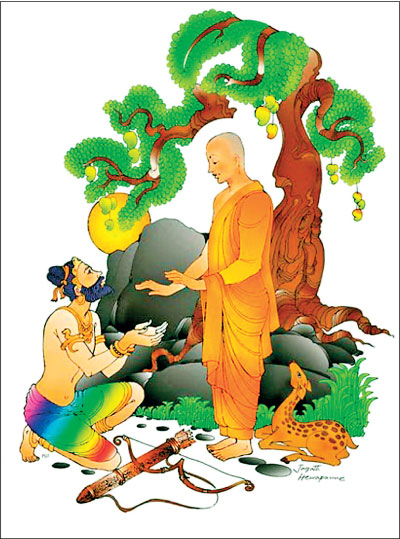Saturday Feb 14, 2026
Saturday Feb 14, 2026
Monday, 12 June 2023 00:26 - - {{hitsCtrl.values.hits}}
 The rate of change has accelerated in rapid shifts in many spheres. From a planetary pandemic we have been exposed to a perilous path of turbulence. We just witnessed a serene Poson Poya with Sri Lanka experiencing some signs of recovery. It is an opportune time to reflect on leading in a BANI world drawing inspirations from Poson.
The rate of change has accelerated in rapid shifts in many spheres. From a planetary pandemic we have been exposed to a perilous path of turbulence. We just witnessed a serene Poson Poya with Sri Lanka experiencing some signs of recovery. It is an opportune time to reflect on leading in a BANI world drawing inspirations from Poson.
Overview
Jamais Cascio, an American anthropologist came up with a refreshingly new world view, and he calls it the BANI world. As he argues, the world today is Brittle, Anxious, Non-Linear and Incomprehensible. He writes about the intersection of emerging technologies, environmental dilemmas, and cultural transformation, specialising in the design and creation of plausible scenarios of the future. His work focuses on the importance of long-term, systemic thinking, emphasising the power of openness, transparency and flexibility as catalysts for building a more resilient society. In 2017, the University of Advancing Technology awarded Cascio an honorary doctorate in recognition of his ongoing work.
 Enter the BANI world
Enter the BANI world
I read a recent Forbes magazine article by Jeroen Kraaijenbrink with much interest with regard to the BANI world. As he explains, BANI says something about people and how they have mistakenly perceived the world up to now. In that sense, BANI should instead be seen as a correction, or a reality check, intending to shatter four illusions of humanity’s current perceptions of the world.
Brittle – The illusion of strength
Brittle means being fragile, breakable, while seeming firm. It refers to something that is not as strong as it seems. It is illusory strength, the belief that “everything will be alright” and the assumptions that “we all know are true,” except that they aren’t. Brittle refers to the myths that people tell themselves and each other to feel better and more secure.
The world has been around for eons, we tend to negate its indestructibility and durability because of its seemingly infinite lifespan. But it is fragile, and it has always been. The fact that people didn’t (want to) see this, and instead assumed that it was unbreakable, doesn’t change that. And that’s what this “new” concept really reveals: that people finally discover that the world, especially its nature, economy, and peacefulness is a fragile, convoluted interconnected ecosystem. Embracing Brittle means letting go this first illusion, the Illusion of Strength.
Anxious – The illusion of control
Anxiety refers to a feeling of helplessness, of being overwhelmed by everything that one faces. It comes with stress and worrying and a fear of not being able to cope with what the world asks—and not really knowing what will come in the first place, thereby making it hard or impossible to make the “right” decisions.
As Jeron observes, anxiety is largely a by-product of information. The more people hear and see, especially bad news, the more anxious they get. Because there’s only so much one can do. And with real-time news coming from all over the world, bombarding us 24/7, it is no surprise that people become anxious—because they’re not in control anymore.
Like the Brittle concept, this says more about people than about the world. Anxiety is a subjective feeling caused by a gap between what one expects and what one experiences. People expect control and for a long time they have been able to hold on to that illusion. The last decades may have been relatively quiet in the Western world, but unrest, war, and crises have always been a normal part of life on this planet. This means people have never been in control. The key difference is that they now finally start realising that (again)—the Illusion of Control.
Non-linear – The illusion of predictability
Non-linearity is already a popular concept for a longer time. In innovation, for example it basically says: there’s no simple straight route from A to B. Instead, there’s detours, dead ends, and unexpected outcomes. It’s also part of the common vocabulary in statistics, where it refers to a relationship between two or more variables that’s not a straight line.
The fact that people increasingly talk about non-linearity again doesn’t say anything about the world in which they live. Non-linearity has always been there and it is a natural feature of any complex system. It is commonly known as the “butterfly effect,” the fact that a chain of cause-effect relationships started by a small event (a butterfly flapping its wings) can result in highly unexpected and disruptive events (a tornado at the other side of the ocean).
This is not something new. It’s a default characteristic of any complex system. What is new and highlighted by the BANI concept is that there is now increased awareness of the non-linearity of our world. This breaks a third illusion, the Illusion of Predictability.
Incomprehensible – The illusion of knowledge
Finally, incomprehensible refers to people’s experience that they don’t understand what is going on. They can’t oversee it, can’t grasp it, can’t interpret what happens, and why. This means they can’t find the answers they are looking for and, as far as they do get answers, that they can’t make sense of the answers either.
This comes with a fourth illusion, the Illusion of Knowledge. People might have thought they understood the world. But they never have. It’s for this reason that experts and scientists frequently say things as “the more I know, the more I realise I don’t know.” The world is a mystery, despite the carefully built-up illusion that we understand it. And maybe that’s not something to worry about. On the contrary, it makes the world and our lives worthwhile. Or as Einstein told us: “There are only two ways to live your life. One is as though nothing is a miracle. The other is as though everything is a miracle.”
BANI and Sri Lanka
Having moved from the COVID “frying pan” to Chaos “fire”, Sri Lanka is a casing point for manifesting BANI. We have a brittle political setup that is supposed to be stable with democratically elected representatives. Needless to state the dire consequences we experience as someone called it a “chase study” than a “case study”.
Anxiety is nothing new to us Sri Lankans. Being indecisive from the leadership end, has resulted in anxiety among masses in multiple fronts. Shortage of vital drugs on one hand, and exorbitant prices of them on the other hand have jointly created much anxiety among suffering millions.
Non-linear path is also becoming increasingly familiar to us Sri Lankans. We have seen that many things do not happen in a straight-forward manner. The delays in obtaining the IMF funds are a timely example where the associated complexities creating delays and frustrations resulting in a bumpy ride.
Incomprehensible with the illusion of knowledge is also having a very high relevance here. How some so called experts came forward to handle economic challenges and failed to deliver is a case in point. The sad truth is that the lack of understanding of the grave issues we face as a nation by the political leaders and their mixed priorities blended with perks and privileges.
Pertinent lessons from Poson
Poson Poya is associated with the arrival of Buddhism in Sri Lanka. It is widely hailed as the beginning of a new era in Sri Lankan civilisation. It commemorates the occasion of Arahat Mahinda, son of Emperor Asoka of India arriving here. The way he converted King Devanampiyatissa to Buddhism is an amazing story to depict the subtle difference between an “owner” and a “servant.”
When referring to the dialogue that took place between the King Devanampiyathissa and Arahat Mahinda, a logical testing of the intelligence of the king can be seen.
“…And are there, besides other mango trees and those trees which are not mango trees, yet other trees?”
“There is this mango tree Sir.”
With that insightful answer, Arahat Mahinda has apparently appreciated the king’s wisdom in advising him, as a ruler to act as more as a servant of the land than the owner of it.
“O King, mighty as you are, it is well to remember that total ownership of the environment is not yours. You are, but the trustee of the mountains, the rivers, the forests, and the oceans which enrich our lives, and it is your bounden duty to hand these down to posterity in the condition in which you inherited them from your forefathers.”
Do we see such a mindset among the modern-day managers and administrators, particularly in the governing circles? Much soul-searching is required in the spirit of Poson towards the search of not only being authoritative but authentic.
Power and authority
In typical management context, the term Power refers to a capacity that one person must influence the behaviour of another, so that the second acts in accordance with the first’s wishes. It is more a capacity or potential as it may exist but not be used. Probably the most important aspect of power is that it is a function of dependence. Let’s take two persons A & B. The greater B’s dependence on A, the greater is A’s power in the relationship. Dependence, in turn, is based on alternatives that B perceives and the importance that B places on the alternative(s) that A controls.
Authority is the legitimate power. The typical dictionary defines it as the institutionalized and legal power inherent in a particular job, function, or position that is meant to enable its holder to successfully carry out his or her responsibilities. It also refers to the power that is delegated formally. It includes a right to command a situation, commit resources, give orders, and expect them to be obeyed, it is always accompanied by an equal responsibility for one’s actions or a failure to act.
King Devanampiyathissa had the authority vested in his rulership being the head of the state. The advice of Arahat Mahinda was to use that authority with better meaning and broader understanding. When the authority vested in the key public sector positions is not properly used to prevent corruption or to promote commitment, it in fact becomes authority wasted. Giving excuses in highlighting limitations whilst pointing fingers at one another which was a prevalent political phenomenon, signified the same sad scene.
Way forward
“Nobody’s going to fix the world for us, but working together, making use of technological innovations and human communities alike, we might just be able to fix it ourselves,” says Jamais Cascio. Living in a world with BANI illusions, we need a BANI ignition, by individuals and institutions alike. I would propose it as being Bold, Assertive, Neutral, and Innovative. The starting point could be a committed move from “ego” to “eco” with much consciousness of sustainability as a true servant in action. That is what Poson tells us in becoming authentic in using authority sensibly for the greater benefit of humanity.
(The writer, a Senior Professor in Management of the Postgraduate Institute of Management (PIM), can be reached at [email protected], [email protected] or www.ajanthadharmasiri.info.)